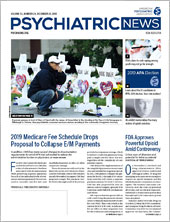The increased risk of mortality in patients with schizophrenia following a heart attack can be reduced with cardioprotective medications, such as antiplatelets, β-blockers, and statins, suggests a
study published in
JAMA Psychiatry.
Patients with schizophrenia worldwide die 15 years younger on average—and have worse outcomes from coronary artery disease—than those in the general population, previous studies have found. This study suggests that poor quality medical care after myocardial infarction (MI) may play an important role in the excess mortality among this population.
“We found that patients with schizophrenia were significantly less likely to receive prescriptions for cardioprotective medications after MI than people from the general population,” lead author Pirathiv Kugathasan, M.D., of Aalborg University in Denmark, told Psychiatric News via email. Such patients were nearly nine times more likely to die, compared with the general population treated, he noted. When patients with schizophrenia received any cardioprotective medication, this risk dropped to twofold.
“Cardioprotective medication after myocardial infarction should be carefully managed to improve prognosis,” Kugathasan and colleagues wrote.
The researchers studied adults aged 30 and older who were treated in Denmark public hospitals with first-time MI over a 20-year period. This group included more than 105,000 individuals; nearly 700 patients (0.7 percent) had a prior diagnosis of schizophrenia. Patients were followed about six to eight years on average.
During the follow-up period, 45 percent of patients with schizophrenia and 27 percent of the other patients died. Most of the deaths in both groups (66 percent) were caused by cardiovascular disease.
The researchers examined the prescriptions for antiplatelets, vitamin K antagonists, β-blockers, angiotensin-converting enzyme inhibitors, and statins received by patients during the follow-up period. They noted the use of monotherapy (treatment with one medication group), dual therapy (use of two), or triple therapy (use of three or more) and compared their use with all-cause mortality during the follow-up.
The triple therapy provided the greatest benefit for all patients. In fact, when patients with schizophrenia received three or more cardioprotective medications in any combination, their mortality risk dropped to about the same as that of the general population who received the same treatment.
Patients with severe mental illness are less likely to take cardioprotective medication after MI because of their poor insight into physical illness, negative attitudes toward medication, and lack of understanding of the purpose of the medications, the authors noted. “These contributing factors may be even worse in patients with schizophrenia, who have cognitive impairment, which has been linked to reduced medication adherence in general.”
Other studies have found that patients with schizophrenia, too, may be less likely to receive specialist care and cardiac procedures following cardiac events. Even for those who do, cardiologists may not have the extra time it takes to care for patients with schizophrenia, Benjamin G. Druss, M.D., M.P.H., professor and Rosalynn Carter Chair in Mental Health at the Rollins School of Public Health of Emory University, told Psychiatric News.
“This study highlights the cracks in the health care system,” Druss added. “With disadvantaged patients, such as those with severe mental illness, we need to have even more systems in place to ensure they receive good quality care.” In an
editorial Druss wrote accompanying the study by Kugathasan and colleagues, he added, “these results indicate a critical need to implement population-level approaches to improve uptake of those treatments among individuals with schizophrenia.”
Effective efforts to narrow the mortality gap for patients with severe mental illness in the United States have included providing primary care physicians on site at mental health clinics and training peer workers in assisting with the management of chronic medical illness, he said.
But there is much psychiatrists can do. “They need to become thoughtful about the medications they’re prescribing, because many have metabolic side effects and must be carefully managed,” Druss continued. “Psychiatrists can also ensure regular screenings are performed, including blood-pressure monitoring and bloodwork to detect cardiovascular problems.” For patients who have had MI, who are at highest risk, “the psychiatrist needs to work closely with patients to ensure they’re getting appropriate medical treatment and to coordinate with their cardiologist to make sure both illnesses are being managed.” ■

